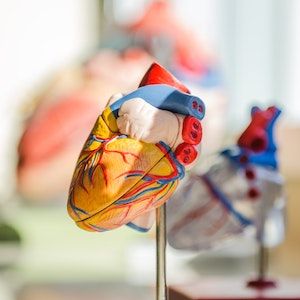Article
USPSTF Updates Aspirin Recommendations for Cardiovascular Disease Prevention
Author(s):
The decision to initiate low-dose aspirin use for CVD prevention in adults aged 40 to 59 years with a 10% or greater 10-year CVD risk should be individualized.

The US Preventive Services Task Force (USPSTF) has updated guidelines on aspirin use to prevent cardiovascular disease (CVD), establishing no recommendations for routine preventive aspirin for any patient.
The recommendation stated the decision to initiate low-dose aspirin use for the primary prevention of CVD in adults aged 40 - 59 years who have a 10% or greater 10-year CVD risk should be an individual one, with only small net benefits observed in this group. This was noted as a Grade C recommendation.
The USPSTF concluded with moderate certainty against initiating low-dose aspirin use for the primary prevention of CVD in adults 60 years or older, noted as a Grade D recommendation.
USPSTF Practice Considerations
The recommendation was applied to adults 40 years or older who presented no signs of symptoms of CVD or known CVD, including history of myocardial infarction or stroke, who are not at increased risk for bleeding (e.g. no history of gastrointestinal ulcers, recent bleeding, other medical conditions, or use of medications that increase bleeding risk).
Overall, CVD is the leading cause of mortality in the US, accounting for more than 1 in 4 deaths. An estimated 605,000 individuals in the US have a first myocardial infarction each year.
It was noted that men carry a higher overall CVD disease burden, although women experience higher mortality from CV events such as stroke. Additionally, the burden of CVD differs by both race and ethnicity, with Black individuals having the higher prevalence of CVD among both sexes.
Moreover, increasing age influences both the American College of Cardiology/American Heart Association (ACC/AHA) estimated 10-year CVD event risk, as well as the risk for gastrointestinal bleeding, intracranial hemorrhage, and hemorrhagic stroke, with or without aspirin use.
Benefits of aspirin for CVD prevention have appeared similar for low-dose (≤100 mg/d) and for all doses that have been studied for CVD prevention trials (50 to 500 mg/d). A reasonable dose may be to use 81 mg/d, which is the most commonly prescribed dose in the US.
As such, the USPSTF has suggested using these risk estimates as a starting point to discuss aspirin use between clinician and patient, with a focus on the potential benefits and harms.
Recommendation Update
The 2016 USPSTF statement on aspirin use in the primary prevention of CVD and colorectal cancer recommended initiating low-dose aspirin use in adults aged 50 - 59 years who had a 10% of greater 10-year CVD risk, are not at increased risk for bleeding, had a life expectancy of at least 10 years, and were willing to take low-dose aspirin daily for ≥10 years.
In addition, the decision to initiate low-dose aspirin in adults aged 60 - 69 years with a 10% or greater 10-year CVD risk should be individualized. The previous evidence was deemed insufficient to assess the balance of benefit and harm of aspirin for CVD prevention in adults younger than 50 years or adults 70 years older.
The current statement has shifted the age ranges and grades of the recommendations on aspirin use, recommending an individualized decision for adults aged 40 - 59 years who have a 10% or greater 10-year CVD risk and recommended against low-dose aspirin for those 60 years or older.
The USPSTF commissioned a systematic review on the effectiveness of aspirin to reduce the risk of CVD events, cardiovascular mortality, and all-cause mortality in individuals without a history of CVD.
They considered 13 randomized clinical trials (RCTs) involving 161,680 participants that reported on the benefits of aspirin use for the primary prevention of cardiovascular morbidity and mortality. The findings determined that aspirin use was associated with a decreased risk of myocardial infarction and stroke, but not cardiovascular mortality or all-cause mortality.
Further, the USPSTF reviewed 14 RCTS in CVD primary prevention populations reporting on the bleeding harms of aspirin. The studies reported a variety of outcomes, including total major bleeds, major gastrointestinal bleeds, extracranial bleeds, hemorrhagic stroke, and intracranial bleeds.
A pooled analysis of 10 trial (n = 119,130) showed that aspirin use was associated with a 58% increase in major gastrointestinal bleeding, while a pooled analysis of 11 trials (n = 134,470) showed an increase in intracranial bleeds in the aspirin group compared with the control group.
More research may be performed to
- improve the accuracy of CVD risk prediction in all racial and ethnic and socioeconomic groups
- gastrointestinal bleeding risk associated with aspirin use in populations representative of the US primary CVD prevention population
- characterizing the distribution of patient preferences across the spectrum of cardiovascular risk.
The USPSTF recommendation statement, “Aspirin Use to Prevent Cardiovascular Disease,” was published in JAMA.




